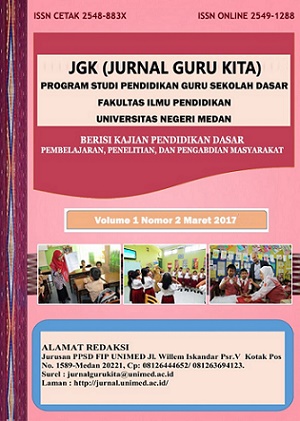Upaya Meningkatkan Hasil Belajar Siswa Pada Mata Pelajaran Pkn Melalui Penerapan Model Pembelajaran NHT di Kelas IX.A SMP Negeri 3 Bahorok
DOI:
https://doi.org/10.24114/jgk.v1i2.6316Abstract
Abstrak : Upaya Meningkatkan Hasil Belajar Siswa Pada Mata Pelajaran Pkn Melalui Penerapan Model Pembelajaran NHT di Kelas IX.A SMP Negeri 3 Bahorok. Penelitian ini bertujuan untuk meningkatkan hasil belajar siswa dengan menerapkan model pembelajaran kooperatif tipe Numbered Heads Together (NHT) selama kegiatan belajar mengajar dalam pembelajaran PKn di Kelas IX.A SMP Negeri 3 Bahorok. Subjek dalam penelitian ini adalah siswa kelas IX.A SMP Negeri 3 Bahorok dengan jumlah siswa sebanyak 22 orang. Melalui penerapan model pembelajaran kooperatif tipe NHT terjadi peningkatan aktivitas dan hasil belajar siswa dalam pembelajaran PKn. Peningkatan terjadi karena selama pembelajaran PKn pada saat pembelajaran siswa sudah dituntut untuk mengemukakan pendapat sehingga materi semakin diingat oleh siswa. Kata Kunci : Model Pembelajaran NHT, Hasil Belajar, Aktivitas Belajar.Downloads
How to Cite
Ridawati, R. (2017). Upaya Meningkatkan Hasil Belajar Siswa Pada Mata Pelajaran Pkn Melalui Penerapan Model Pembelajaran NHT di Kelas IX.A SMP Negeri 3 Bahorok. JGK (Jurnal Guru Kita), 1(2), 102–111. https://doi.org/10.24114/jgk.v1i2.6316
Issue
Section
Articles
License
Authors published with the JGK (Jurnal Guru Kita) agree to the following terms:
- Authors retain copyright and grant the journal the right of first publication with the work simultaneously licensed under a Creative Commons Attribution License (CC BY-SA 4.0) that allows others to share the work with an acknowledgment of the work's authorship and initial publication in this journal.
- Authors are able to enter into separate, additional contractual arrangements for the non-exclusive distribution of the journal's published version of the work (e.g., post it to an institutional repository or publish it in a book), with an acknowledgment of its initial publication in this journal.
- Authors are permitted and encouraged to post their work online (e.g., in institutional repositories or on their website) prior to and during the submission process, as it can lead to productive exchanges, as well as earlier and greater citation of published work. (See The Effect of Open Access)


























